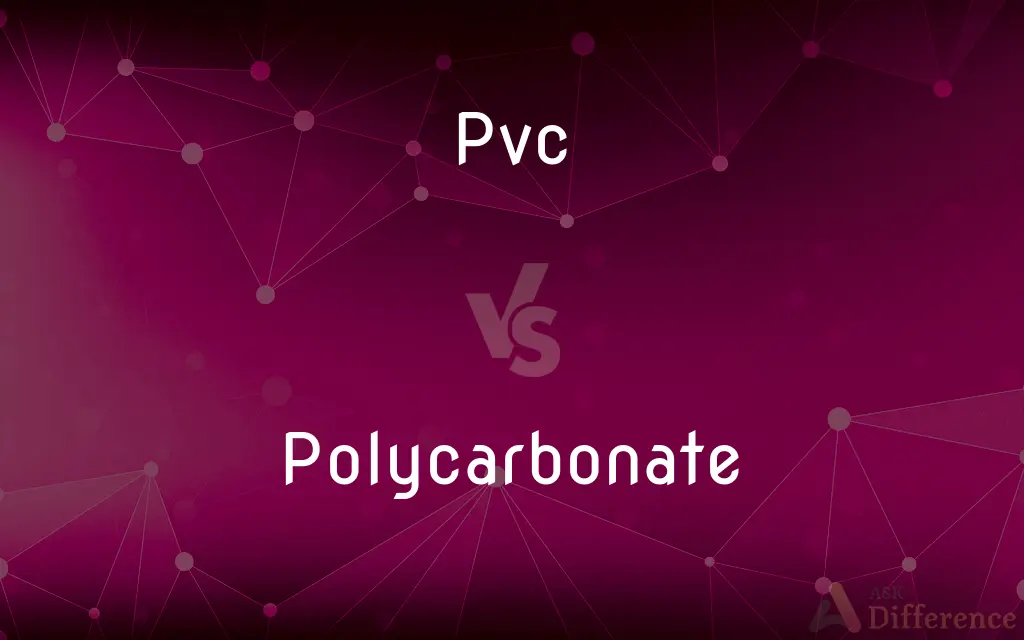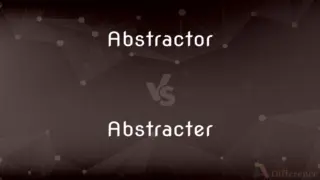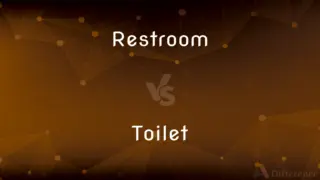PVC vs. Polycarbonate — What's the Difference?
By Tayyaba Rehman — Updated on October 12, 2023
PVC (Polyvinyl Chloride) is a durable, flexible plastic, while Polycarbonate is a strong, transparent plastic resistant to impacts.

Difference Between PVC and Polycarbonate
Table of Contents
ADVERTISEMENT
Key Differences
PVC, standing for Polyvinyl Chloride, is one of the most versatile plastics, used widely due to its durability and cost-effectiveness. In contrast, Polycarbonate is recognized for its transparency and extraordinary strength, often used when clarity and impact resistance are vital.
In construction, PVC is preferred for plumbing pipes and vinyl siding because of its resistance to chemicals and corrosion. On the other hand, Polycarbonate, due to its clarity and strength, is used for applications like safety glasses and bulletproof windows.
When considering flexibility, PVC can be made softer and more bendable with the addition of plasticizers, making it suitable for products like cables and vinyl flooring. Polycarbonate, while inherently rigid, boasts high optical clarity, making it ideal for eyeglass lenses and optical discs.
In terms of environmental considerations, PVC can release toxic chemicals when burned and is less recyclable compared to other plastics. Polycarbonate, though more recyclable, contains BPA, which has raised health concerns in food-contact items.
Both PVC and Polycarbonate offer unique advantages based on their properties. While PVC is prized for its versatility in numerous industries, Polycarbonate stands out in sectors requiring high strength combined with transparency.
ADVERTISEMENT
Comparison Chart
Chemical Name
Polyvinyl Chloride
Polycarbonate
Flexibility
Can be made flexible
Rigid
Primary Use
Plumbing, Vinyl flooring
Eyeglass lenses, Bulletproof windows
Transparency
Generally opaque
Transparent
Environmental Concern
Less recyclable, releases toxins when burned
Contains BPA, more recyclable
Compare with Definitions
Pvc
A versatile synthetic plastic polymer.
The pipes in my house are made of PVC.
Polycarbonate
Contains BPA in its structure.
Some food containers avoid Polycarbonate due to BPA concerns.
Pvc
Can be made flexible with plasticizers.
The electric cables use flexible PVC as insulation.
Polycarbonate
Highly resistant to impacts.
The safety goggles are crafted from Polycarbonate to withstand impacts.
Pvc
Often utilized for vinyl products.
My new raincoat is made of PVC.
Polycarbonate
A strong plastic known for its transparency.
Her eyeglass lenses are made of Polycarbonate for clarity.
Pvc
Used widely in the construction sector.
PVC windows are cost-effective and durable.
Polycarbonate
Used in bulletproof applications.
The bank's windows are Polycarbonate for enhanced security.
Pvc
Known for resistance to chemicals and corrosion.
PVC is the preferred material for chemical storage tanks.
Polycarbonate
Suitable for optical applications.
DVDs are often made from Polycarbonate due to its optical properties.
Pvc
A polymer of vinyl chloride used instead of rubber in electric cables
Polycarbonate
Polycarbonates (PC) are a group of thermoplastic polymers containing carbonate groups in their chemical structures. Polycarbonates used in engineering are strong, tough materials, and some grades are optically transparent.
Pvc
Irregularity of cardiac rhythm; recurrent occurrences can be a precursor of ventricular fibrillation
Polycarbonate
Any of a group of thermoplastics that are linear polyesters of carbonic acid, especially those derived from bisphenol A and phosgene, characterized by high-impact strength, light weight, and flexibility, and used as shatter-resistant substitutes for glass.
Polycarbonate
(chemistry) Any of a range of polymers of aromatic carbonates; they are used to make light, flexible alternatives to glass. Abbreviation: PC
Common Curiosities
Which is more flexible: PVC or Polycarbonate?
PVC can be made more flexible, while Polycarbonate is generally rigid.
What does PVC stand for?
PVC stands for Polyvinyl Chloride.
Can PVC be made transparent like Polycarbonate?
While some PVC can be made translucent, it doesn't match the optical clarity of Polycarbonate.
Which is more environmentally friendly: PVC or Polycarbonate?
While both have concerns, Polycarbonate is more recyclable, but PVC can release toxins when burned.
Which material is preferred for window applications?
While PVC is used for window frames, Polycarbonate is used for bulletproof or high-impact windows.
Is Polycarbonate naturally transparent?
Yes, Polycarbonate is inherently transparent, making it suitable for optical uses.
Why is Polycarbonate used for eyeglasses?
Polycarbonate's high optical clarity and impact resistance make it ideal for eyeglasses.
Is PVC used in the medical field?
Yes, PVC is used in medical devices due to its flexibility and chemical resistance.
Are there health concerns associated with Polycarbonate?
Yes, Polycarbonate contains BPA, which has raised health concerns, especially in food-contact items.
Is Polycarbonate used in the automotive industry?
Yes, Polycarbonate is used in automotive applications for its strength and clarity, such as in headlights.
Is PVC resistant to chemicals?
Yes, PVC is known for its resistance to chemicals and corrosion.
How is the strength of Polycarbonate compared to other plastics?
Polycarbonate is one of the strongest plastics, especially regarding impact resistance.
What makes PVC suitable for construction applications?
PVC's durability, resistance to corrosion, and cost-effectiveness make it preferred in construction.
Why might Polycarbonate be chosen over glass in some applications?
Polycarbonate is lighter, more impact-resistant, and less shatter-prone than glass, making it preferable for safety applications.
Can PVC be recycled?
PVC is less recyclable compared to many other plastics due to the additives used.
Share Your Discovery

Previous Comparison
Abstractor vs. Abstracter
Next Comparison
Restroom vs. ToiletAuthor Spotlight
Written by
Tayyaba RehmanTayyaba Rehman is a distinguished writer, currently serving as a primary contributor to askdifference.com. As a researcher in semantics and etymology, Tayyaba's passion for the complexity of languages and their distinctions has found a perfect home on the platform. Tayyaba delves into the intricacies of language, distinguishing between commonly confused words and phrases, thereby providing clarity for readers worldwide.
















































